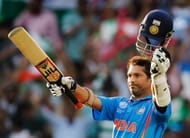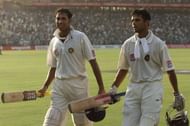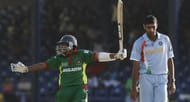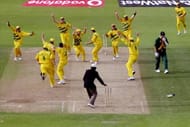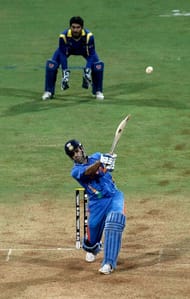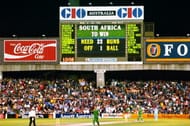In India, cricket is larger than life. We are drawn towards the game because it is exhilarating, enjoyable and teaches us so many things. Here are some of the valuable life lessons from the Gentleman’s game.
No matter how hard the situation is, no matter how impossible the feat might be, give it a try. Because if you don’t, you don’t deserve to play anymore.
Graeme Smith broke his arm and retired hurt. 9 wickets fell and Australia began celebrating. To the bewilderment of everyone, Smith came back into the ground. With a fractured hand, he survived more than 20 balls. With only 11 balls to go, a Mitchell Johnson’s yorker cleaned up Smith and Australia won the Test match.
That didn’t matter. Smith might have had a broken arm that day, but he was not a broken man. He could have easily conceded the Test match when 9 wickets fell, but he didn’t. He gave it a try. He pushed himself despite the pain. He pushed himself despite knowing that South Africa had already won the Test series.
“If you marry a phenomenal work ethic with the talent you are born with, then you can achieve almost anything” – Harsha Bhogle
Talent is one part. How many child prodigies have become absolute masters of their field when they grew up? But if you marry that talent with a phenomenal work ethic, you become the master.
Tendulkar was always going to be big. With the Indian cap at just 16 years of age, he was always going to be the next big thing in cricket. But all that didn’t happen overnight. How many times did Tendulkar suffer a setback due to an injury? If he was devoid of a proper work ethic, he wouldn’t have come back from all those. But he did. Time and again.
So, if you develop your work ethic along with your talent, you can master anything.
“Lost causes are the only causes worth fighting for. Remember that nothing is ever truly lost”
A first innings deficit of more than 250 runs playing against the one of the greatest Test sides of all time. Defeat was looming large. At Eden Gardens in 2001, Rahul Dravid and VVS Laxman put on a relentless show to sink the great Australian team despite all these situations.
West Indies vs Australia in 2013 at St.John’s, Australia vs Pakistan in 2010 at Sydney, that magnificent ODI match between South Africa and Australia in 2006, and many other instances prove the above adage right.
Cricket teaches us time and again that we can come back from lost causes, that we can always salvage something no matter how bad the situation is.
“Never underestimate the opposition, no matter how weak they might be”
India vs Bangladesh, 2007. Possibly the saddest day in Indian cricket‘s history. With an almost picture-perfect squad, India travelled to the West Indies for the World Cup only to come back after the group stages.
West Indies vs India, 1983 World Cup finals. How many expected India to win that day?
No matter what field you are in, no matter how weak the opposition is, never ever underestimate them. They want to win as much as you do.
“Don’t count your chickens before they hatch”
South Africa were the favourites to win the 1999 World Cup. In the final match of the Super Six stage, Australia needed a win against South Africa to progress to the semi-finals. South Africa were already safe.
The South Africans batted first. Gibbs scored a wonderful century and they finished at 271. The Australian chase was rocky. They were 48/3 when Steve Waugh came into the crease. Waugh began slowly; and when he was batting at 56, he gave a simple catch to Gibbs who was standing at mid-wicket. Gibbs took the easy catch; and before the ball was fully into his hand, he threw the ball skywards, celebrating. The ball fell out of his grasp and hit the ground. Waugh went on to score 120 runs and Australia qualified for the semi-finals.
The semi-final match between these two teams ended in a draw and Australia progressed because they had earlier defeated South Africa in the group stages. That drop by Gibbs was the pivotal point in all this drama. As Steve Waugh puts it, Gibbs did not drop a catch, he dropped the World Cup.
Never try to count your chickens before they hatch.
“One ultimately random incident can have a huge impact in your life”
Nobody expected MS Dhoni to come in at No.4 during the 2011 World Cup finals, but he did. And that changed the course of that match.
A flying catch by Dinesh Karthik, who was a substitute during the 2007 T20 World Cup against South Africa in a potential knock-out match, turned the tide and helped India win that match and ultimately the World Cup. But in the history books, it would just be a random event.
One moment of magnificence, one moment of sheer magic which would ultimately be a random incident after a few decades could actually have a huge impact in your life.
“Not everything is fair, buck up!”
The year was 1992. South Africa were a nation free from Apartheid. They easily made it to the semi-finals when they faced off against England. England scored 252 runs from the allotted maximum of 45 overs. South Africa needed 22 runs from 2.1 overs. Then came a 12-minute rain delay.
12 minutes of rain that changed the course of an entire match.
In 1992, in case of a rain delay, they used the lowest-scoring overs of the team batting first to set the revised target. The rule was complicated and hard to understand. The revised target was a joke – South Africa needed 22 runs from 1 ball.
The South Africans couldn’t do anything. They faced the final ball and went back to their dressing rooms.
Life, like cricket, is not fair at all times. Try to cope up with it.
Looking for fast live cricket scores? Download CricRocket and get fast score updates, top-notch commentary in-depth match stats & much more! 🚀☄️

